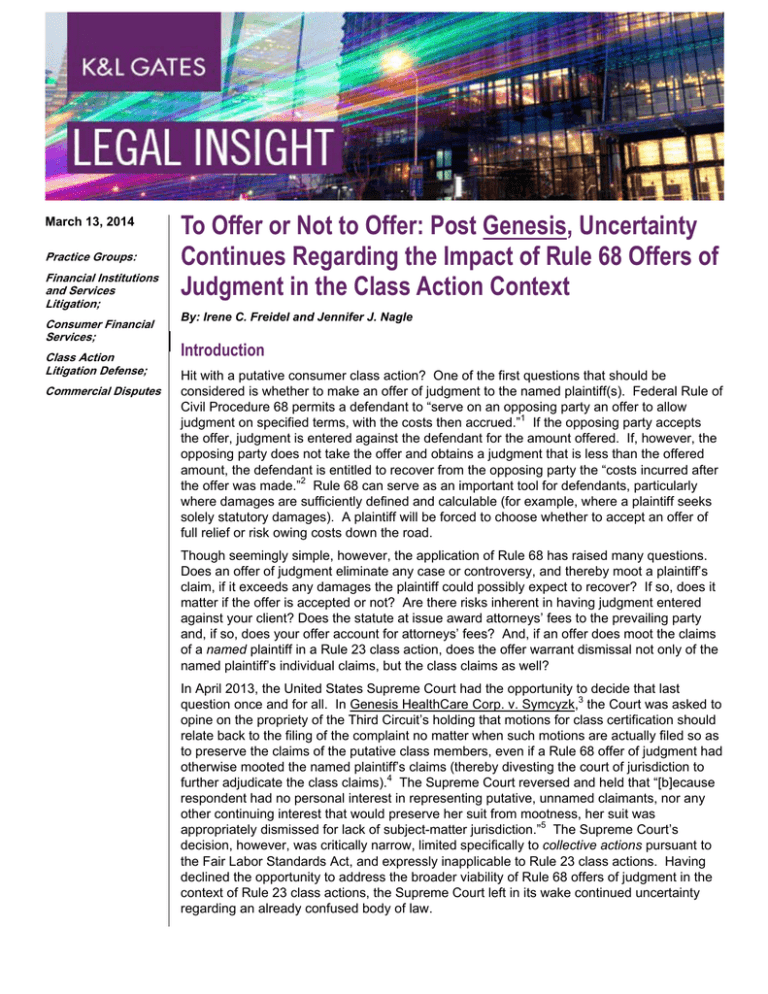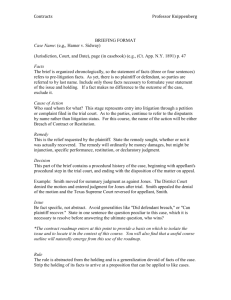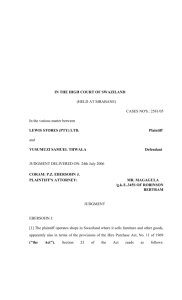
March 13, 2014
Practice Groups:
Financial Institutions
and Services
Litigation;
Consumer Financial
Services;
Class Action
Litigation Defense;
Commercial Disputes
To Offer or Not to Offer: Post Genesis, Uncertainty
Continues Regarding the Impact of Rule 68 Offers of
Judgment in the Class Action Context
By: Irene C. Freidel and Jennifer J. Nagle
Introduction
Hit with a putative consumer class action? One of the first questions that should be
considered is whether to make an offer of judgment to the named plaintiff(s). Federal Rule of
Civil Procedure 68 permits a defendant to “serve on an opposing party an offer to allow
judgment on specified terms, with the costs then accrued.”1 If the opposing party accepts
the offer, judgment is entered against the defendant for the amount offered. If, however, the
opposing party does not take the offer and obtains a judgment that is less than the offered
amount, the defendant is entitled to recover from the opposing party the “costs incurred after
the offer was made.”2 Rule 68 can serve as an important tool for defendants, particularly
where damages are sufficiently defined and calculable (for example, where a plaintiff seeks
solely statutory damages). A plaintiff will be forced to choose whether to accept an offer of
full relief or risk owing costs down the road.
Though seemingly simple, however, the application of Rule 68 has raised many questions.
Does an offer of judgment eliminate any case or controversy, and thereby moot a plaintiff’s
claim, if it exceeds any damages the plaintiff could possibly expect to recover? If so, does it
matter if the offer is accepted or not? Are there risks inherent in having judgment entered
against your client? Does the statute at issue award attorneys’ fees to the prevailing party
and, if so, does your offer account for attorneys’ fees? And, if an offer does moot the claims
of a named plaintiff in a Rule 23 class action, does the offer warrant dismissal not only of the
named plaintiff’s individual claims, but the class claims as well?
In April 2013, the United States Supreme Court had the opportunity to decide that last
question once and for all. In Genesis HealthCare Corp. v. Symcyzk,3 the Court was asked to
opine on the propriety of the Third Circuit’s holding that motions for class certification should
relate back to the filing of the complaint no matter when such motions are actually filed so as
to preserve the claims of the putative class members, even if a Rule 68 offer of judgment had
otherwise mooted the named plaintiff’s claims (thereby divesting the court of jurisdiction to
further adjudicate the class claims).4 The Supreme Court reversed and held that “[b]ecause
respondent had no personal interest in representing putative, unnamed claimants, nor any
other continuing interest that would preserve her suit from mootness, her suit was
appropriately dismissed for lack of subject-matter jurisdiction.”5 The Supreme Court’s
decision, however, was critically narrow, limited specifically to collective actions pursuant to
the Fair Labor Standards Act, and expressly inapplicable to Rule 23 class actions. Having
declined the opportunity to address the broader viability of Rule 68 offers of judgment in the
context of Rule 23 class actions, the Supreme Court left in its wake continued uncertainty
regarding an already confused body of law.
To Offer or Not to Offer: Post Genesis, Uncertainty
Continues Regarding the Impact of Rule 68 Offers of
Judgment in the Class Action Context
Rule 68 Jurisprudence
The viability of Rule 68 offers of judgment in the context of class actions has been the
subject of inconsistent and conflicting judicial authority, both across and within jurisdictions.
Courts have been largely divided with respect to whether a Rule 68 offer of judgment that
moots a named plaintiff’s claims equally moots the class action in its entirety.
The Third, Ninth, and Tenth Circuit Courts of Appeals have found that offers of judgment to a
named plaintiff do not moot a class action prior to a final decision on class certification. Akin
to the treatment sought by the respondent in Genesis, these Courts have applied the
relation-back doctrine such that timely certification motions are regarded as having been filed
the same day as the complaint.6 The Ninth Circuit summed up this approach as follows:
[A]n unaccepted Rule 68 offer of judgment—for the full amount of the
named plaintiff’s individual claim and made before the named plaintiff
files a motion for class certification—does not moot a class action. If the
named plaintiff can still file a timely motion for class certification, the
named plaintiff may continue to represent the class until the district court
decides the class certification issue…. Only once the denial of class
certification is final does the defendant’s offer—if still available—moot the
merits of the case because the plaintiff has been offered all that he can
possibly recover through litigation.7
Pursuant to this approach, defendants are prohibited from using Rule 68 as a mechanism to
cut off the Court’s ability to adjudicate the issue of class certification and to “pick off” class
representatives.8
The Seventh Circuit, on the other hand, has largely settled the issue such that offers of
judgment are permitted in—and can moot—class actions either before a motion for
certification is filed or after the denial of such a motion.9 According to the Seventh Circuit, an
offer of judgment filed prior to the time at which class certification is sought is acceptable
because “before the class is certified, which is to say at a time when there are many potential
party plaintiffs to the suit, an offer to one is not an offer of the entire relief sought by the suit .
. . unless the offer comes before class certification is sought, and so before the existence of
other potential plaintiffs has been announced.”10
The case law in other jurisdictions is uncertain on this issue. District courts in the Second
and Eighth Circuits, for example, ruling in the absence of express guidance from their
respective Circuit Courts of Appeals, have issued inconsistent decisions. Some have
mooted class actions altogether where an offer of judgment satisfied the named plaintiff’s
claims prior to a decision on class certification; others have followed the reasoning of the
Third, Ninth, and Tenth Circuits and prohibited such a result.11
2
To Offer or Not to Offer: Post Genesis, Uncertainty
Continues Regarding the Impact of Rule 68 Offers of
Judgment in the Class Action Context
Conclusion
Approaching the one-year anniversary of the Genesis decision, sufficient time has passed to
evaluate its impact. In fact, dozens of published decisions have cited the Genesis decision
since its issuance in April 2013. Yet, the Supreme Court’s decision does not appear to have
changed the game with respect to Rule 68 in the class action context. Rather, the
inconsistency persists, and Genesis has repeatedly been dismissed as inapplicable in the
Rule 23 context.12 Nevertheless, defendants should continue to evaluate Rule 68 as a
procedural mechanism for the potential, inexpensive resolution of putative class action
claims in the early stages of litigation. The effectiveness of the tool will depend largely on
the law in a particular jurisdiction, but given the pervasive inconsistencies in the authorities,
considering the offer of judgment option and exploring a jurisdiction’s body of law in each
case may be well worth the effort.
Authors:
Irene C. Freidel
irene.freidel@klgates.com
+1.617.951.9154
Jennifer Janeira Nagle
jennifer.nagle@klgates.com
+1.617.951.9197
Anchorage Austin Beijing Berlin Boston Brisbane Brussels Charleston Charlotte Chicago Dallas Doha Dubai Fort Worth Frankfurt
Harrisburg Hong Kong Houston London Los Angeles Melbourne Miami Milan Moscow Newark New York Orange County Palo Alto Paris
Perth Pittsburgh Portland Raleigh Research Triangle Park San Diego San Francisco São Paulo Seattle Seoul Shanghai Singapore Spokane
Sydney Taipei Tokyo Warsaw Washington, D.C. Wilmington
K&L Gates practices out of 48 fully integrated offices located in the United States, Asia, Australia, Europe, the
Middle East and South America and represents leading global corporations, growth and middle-market companies,
capital markets participants and entrepreneurs in every major industry group as well as public sector entities,
educational institutions, philanthropic organizations and individuals. For more information about K&L Gates or its
locations, practices and registrations, visit www.klgates.com.
This publication is for informational purposes and does not contain or convey legal advice. The information herein should not be used or relied upon in
regard to any particular facts or circumstances without first consulting a lawyer.
© 2014 K&L Gates LLP. All Rights Reserved.
1
See Fed. R. Civ. P. 68(a).
See Fed. R. Civ. P. 68(d).
3
Genesis HealthCare Corp., et al. v. Symcyzk, ___ U.S. ___, 133 S. Ct. 1523 (2013).
2
3
To Offer or Not to Offer: Post Genesis, Uncertainty
Continues Regarding the Impact of Rule 68 Offers of
Judgment in the Class Action Context
4
Symcyzk v. Genesis HealthCare Corp., 656 F.3d 189 (3d Cir. 2011).
Genesis HealthCare Corp., 133 S. Ct. at 1525.
6
See e.g., Weiss v. Regal Collections, 385 F.3d 337, 349 (3d Cir. 2004) (“[W]e believe the tension
between Fed. R. Civ. P. 23 and Fed. R. Civ. P. 68 should be addressed through the ‘relation back’
analysis”).
7
Pitts v. Terrible Herbst, Inc., 653 F.3d 1081, 1091-92 (9th Cir. 2011); see also Lucero v. Bureau of
Collection Recovery, Inc., 639 F.3d 1239, 1250 (10th Cir. 2011) (“In sum, we hold that a named plaintiff in
a proposed class action for monetary relief may proceed to seek timely class certification where an
unaccepted offer of judgment is tendered in satisfaction of the plaintiff’s individual claim before the court
can reasonably be expected to rule on the class certification motion”).
8
See e.g., Clausen Law Firm, PLLC v. Nat’l Acad. of Continuing Legal Educ., 827 F. Supp. 2d 1262, 1272
(W.D. Wash. 2010) (“[t]he Court concludes that this case involves the precise scenario as to which
application of the ‘relation back’ approach is appropriate to prevent a defendant’s Rule 68 offer from
thwarting a proposed class action”).
9
Greisz v. Household Bank, 176 F.3d 1012, 1015 (7th Cir. 1999). But see Wilder Chiropractic, Inc. v.
Pizza Hut of Wisconsin, Inc., 754 F. Supp. 2d 1009, 1015-19 (W.D. Wis.) 2010) (denying defendant’s
motion to dismiss for lack of jurisdiction where plaintiff filed a motion for class certification within the
time for responding to the Rule 68 offer).
10
Id.; see also Letellier v. First Credit Servs., Inc., 2001 WL 826873 (N.D. Ill. Jul.20, 2001); Wiskur v.
Short Term Loans, 94 F. Supp. 2d 937, 939 (N.D. Ill. 2000); Gonon v. Allied Interstate, LLC, 286 F.R.D.
405 (S.D. Ind. Oct 10, 2012) (dismissing putative class action lawsuit for lack of jurisdiction where Rule 68
offer of judgment had mooted the named plaintiff’s claims and holding that it was not appropriate for a
subsequently filed motion for class certification to “relate back” to the filing of the complaint”). The
Seventh Circuit’s separate tender doctrine—which provides yet another avenue for class action defendants
to moot a class action early in a litigation—will be addressed in a forthcoming update: “To Moot Or Not To
Moot: The Seventh Circuit’s Tender Doctrine Provides A Powerful Tool For Class Action Defendants.”
11
As to the Second Circuit: Compare Greif v. Wilson, Elser, Moskowitz, Edelman & Dicker LLP, 258 F.
Supp. 2d 157, 160-61 (E.D.N.Y. 2003) (entire class action mooted by defendant’s pre-certification offer of
judgment, which fully satisfied plaintiff’s claims) and Ambalu v. Rosenblatt, 194 F.R.D. 451, 453
(E.D.N.Y. 2000) (“[i]f a named representative’s claim becomes moot before class certification, the entire
case is to be dismissed for lack of subject matter jurisdiction”); with Schaake v. Risk Mgmt. Alternatives,
Inc., 203 F.R.D. 108, 112 (S.D.N.Y. 2001) (rejecting offers of judgment before the filing of motions for
class certification because permitting the use of such a procedural mechanism at that time would “allow
defendants to essentially opt-out of Rule 23, by allowing a defendant to avoid liability for class wide relief,
which could be prevented by the mere service of a Rule 68 offer at the outset of the case”). As to the
Eighth Circuit: Compare Liles v. Am. Corrective Counseling Servs., Inc., 201 F.R.D. 452, 455 (S.D. Iowa
2001) (following the Fifth Circuit’s reasoning and prohibiting a defendant from “short-circuiting” a class
action by offers of judgment), Mertz v. Lindell Bank & Trust Co., 2012 WL 1080824, at *1 (E.D. Mo.
March 30, 2012) (“Because the offer of judgment here did not extend to the putative class representatives,
and because the offer was made before plaintiff could reasonably have been expected to file a motion for
class certification, the offer, in this instance failed to render plaintiff’s case moot”), and Lamberson v. Fin.
Crimes Servs., LLC, 2011 WL 1990450, at *2 (D. Minn. Apr. 13, 2011) (“even if a precertification offer of
judgment redresses the injuries of the plaintiff, this does not moot the controversy as to the putative class”);
with Goans Acquisition, Inc. v. Merchant Solutions, LLC, 2013 WL 5408460, at *6 (W.D. Mo. Sept. 26,
2013) (dismissing class action claim on the grounds that a Rule 68 offer of judgment mooted plaintiff’s
claims when made prior to the filing of a motion for class certification).
5
4
To Offer or Not to Offer: Post Genesis, Uncertainty
Continues Regarding the Impact of Rule 68 Offers of
Judgment in the Class Action Context
12
See e.g., Schlaud v. Snyder, 717 F.3d 451, 456, n.3 (6th Cir. 2013) (“[t]he Court's decision in Genesis
Healthcare Corp. v. Symczyk is not at odds with this determination because it does not involve class
certification under Rule 23”); March v. Medicredit, Inc., 2013 WL 6265070, at *2 (E.D. Mo. Dec. 4, 2013)
(“the Genesis case is inapposite to the present Rule 23 class action complaint”); Kensington Physical
Therapy, Inc. v. Jackson Therapy Partners, LLC, --- F.Supp.2d ----, 2013 WL 5476979, at *6 (D. Md. Oct.
2, 2013) (“Genesis involved a FLSA collective action, whereas this case presents a Rule 23 class action. . . .
Genesis does not answer the question before the Court.”); Knutson v. Schwan's Home Serv., Inc., 2013 WL
4774763, at *11 (S.D. Cal. Sept 5,2013) (granting class certification in part) (“Genesis, however, involved
a collective action under the Fair Labor Standards Act, which the Supreme Court recognized is
fundamentally different from Rule 23 class actions . . . . Thus, the Court does not apply Genesis to these
facts.”); Sandusky Wellness Center LLC v. Medtox Scientific, Inc., 2013 WL 3771397, at *2 (D. Minn.
July 18, 2013) (“Sandusky responds that Genesis is inapposite, as its applicability is limited to FLSA
collective actions. The court agrees.”); Canada v. Meracord, LLC, 2013 WL 2450631, at *1 (W.D. Wash.
June 6, 2013) (“there is nothing to indicate that the specific holding extends beyond FLSA collective
actions … [and] this Court declines to apply the Genesis holding to the facts of this class action”).
5




![[2012] NZEmpC 75 Fuqiang Yu v Xin Li and Symbol Spreading Ltd](http://s3.studylib.net/store/data/008200032_1-14a831fd0b1654b1f76517c466dafbe5-300x300.png)


